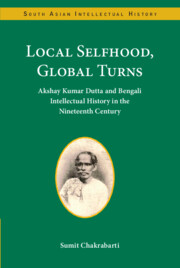 Local Selfhood, Global Turns
Local Selfhood, Global Turns Published online by Cambridge University Press: 30 June 2023
In the preceding chapters I have laid out the two major, albeit connected, narratives of religion and science that were instrumental in shaping the intellectual horizon of Akshay Dutta's mind. His milieu was one of debate and discussion, influences that emerged out of a complex network of intellectual practice qualified by colonial modernity and its associated implications of a global labour–capital dynamic working from within a colonizer–colonized binary. It was a space where the principal aim of science education and practice was to develop a utilitarian template leading to motives of profit through governance and vice versa. The questions of religion and individual religious practice, on the other hand, were implicated by complex processes of reform and refashioning that often had their own transnational and global influences and subversive intent. The figure of Akshay Dutta emerges through this web-like narrative as part of the bhadralok milieu of nineteenth-century Calcutta through events and articulations that will not be subsumed within an easy and overbearing trope of either colonialism or nationalism, modernity or otherwise, but remain as a symptom of the fraught nature of the intellectual tendencies of the period.
Akshay and Rammohun: Imagining the Universe
Akshay Dutta spent the most crucial and active years of his working life as the editor of the Tattwabodhini Patrika between 1843 and 1855. A substantial part of his oeuvre, books or tracts that were subsequently published as individual volumes, germinated in the pages of the Tattwabodhini. It may be said that the larger part of Akshay's intervention into the intellectual and social structures of nineteenth-century Bengal was initiated or provoked through either what he wrote or what he, as the editor, published in the pages of the Tattwabodhini. It was during this Tattwabodhini period that, one might say, Akshay emerged as a crucial player in the larger canvas of Bengali intellectual history through the way he shaped the debates and discussions around the pages of the periodical. In the first chapter I have referred to his ideological debate with Debendranath Tagore regarding the nature of the Brahman and the infallibility of the Vedanta. Although there remained a clear ideological rift between the two, the pages of the Tattwabodhini bear ample testimony to Akshay's considerable independence in choosing the subject matter for the issues of the periodical
To save this book to your Kindle, first ensure [email protected] is added to your Approved Personal Document E-mail List under your Personal Document Settings on the Manage Your Content and Devices page of your Amazon account. Then enter the ‘name’ part of your Kindle email address below. Find out more about saving to your Kindle.
Note you can select to save to either the @free.kindle.com or @kindle.com variations. ‘@free.kindle.com’ emails are free but can only be saved to your device when it is connected to wi-fi. ‘@kindle.com’ emails can be delivered even when you are not connected to wi-fi, but note that service fees apply.
Find out more about the Kindle Personal Document Service.
To save content items to your account, please confirm that you agree to abide by our usage policies. If this is the first time you use this feature, you will be asked to authorise Cambridge Core to connect with your account. Find out more about saving content to Dropbox.
To save content items to your account, please confirm that you agree to abide by our usage policies. If this is the first time you use this feature, you will be asked to authorise Cambridge Core to connect with your account. Find out more about saving content to Google Drive.